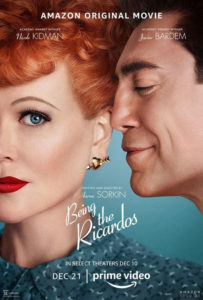 By Steve Crum
By Steve Crum
Lucille Ball and Desi Arnaz were great. Nicole Kidman and Javier Bardem are great portraying them. There. I have channeled what Lucy & Ricky fans want to know first about Aaron Sorkin’s wonderfully conceived Being the Ricardos.
The bittersweet film, written and directed by Sorkin, stands as not only a behind-the-scenes look at Mr. and Mrs. Arnaz, including how they met, but a testament to the gem among gems of early 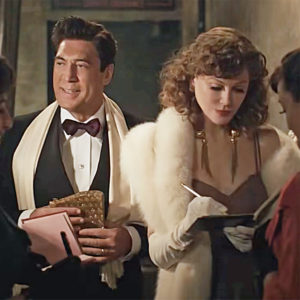 television. I Love Lucy (1951-57) influenced the technology and format of sitcoms, particularly, to this day. In that sense, Being the Ricardos is more historical than hysterical. The laughs are limited with an emphasis on drama.
television. I Love Lucy (1951-57) influenced the technology and format of sitcoms, particularly, to this day. In that sense, Being the Ricardos is more historical than hysterical. The laughs are limited with an emphasis on drama.
Overall, Sorkin’s crisp and savvy dialogue dominates. But how did he successfully pull off this biographical ruse?
Aaron Sorkin’s screenplay and direction accomplishes the switch several ways. Before going further, realize that the audience for Being the Ricardos has to be I Love Lucy fans. (Compared to today’s popular TV shows that are considered a hit with 15 million viewers, I Love Lucy consistently played to 60 million per episode!) The viewer demographic, therefore, is middle-aged to Baby Boomer. That premise is totally reliant on the audience having seen at least the classic I Love Lucy episodes. That includes the Lucy stomping grapes, the Lucy pregnant 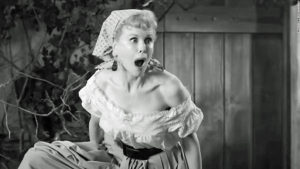 with Little Ricky, and the Lucy trying to reunite a quarreling Fred and Ethel.
with Little Ricky, and the Lucy trying to reunite a quarreling Fred and Ethel.
The next given, which is pretty brilliant, involves not showing too much of, say, the hilarious winery/grape stomping sequence. Just set it up by duplicating the Italian winery set, and placing Kidman in matching Lucy costume. Then have her repeat the original TV dialogue as she steps into the grape vat. She does a pratfall, but that is all we see. It’s all we need to see because we have seen the original so many times. Our minds fill in the slapstick gaps.
There is no need for Nicole Kidman to fully duplicate the classic physical shtick, which is a plus since there is no way anyone could do so. She gives us enough to suggest the hilarity that will follow.
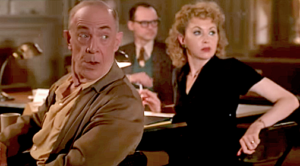 Also, Kidman’s makeup, body language, and voice are more than enough to suggest Lucille Ball. It is uncanny.
Also, Kidman’s makeup, body language, and voice are more than enough to suggest Lucille Ball. It is uncanny.
The same elements of suggestion are carried out by Bardem’s Ricky/Desi, Nina Arianda’s Ethel/Vivian, and J. K. Simmons’ Fred/William. Their channeling of the actual characters and actors quickly becomes our channeling of their transformations. Again a stretch, but it works.
Really, not even 1/4 of Being the Ricardos showcases the actual filmed episodes of I Love Lucy. That means Kidman and Co. are mainly realized as Lucille Ball, Desi Arnaz, Vivian Vance and William Frawley. Totally 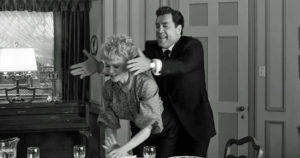 believable they are. Bardem is definitely not a Desi Arnaz double, but we accept him as Desi. Acting, ladies and gentlemen!
believable they are. Bardem is definitely not a Desi Arnaz double, but we accept him as Desi. Acting, ladies and gentlemen!
In that vein, an award for Best Ensemble should include Tony Hale as Producer Jess Oppenheimer, Alia Shawkat’s co-writer Madelyn Pugh, and Jake Lacy’s co-writer Bob Carroll Jr. Their interplay during the table readings is delicious—Sorkin at his best.
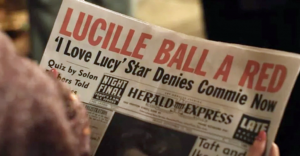 Appropriately covered are Desi’s philandering and Lucy’s distrust of him; William Frawley’s incessant digs at Vivian Vance; and Lucy’s being labeled a Communist.
Appropriately covered are Desi’s philandering and Lucy’s distrust of him; William Frawley’s incessant digs at Vivian Vance; and Lucy’s being labeled a Communist.
As for scenes of Ricky belting out Babalu and Cuban Pete (Desi’s signature songs), it is Javier Bardem’s own voice, accompanied by his own conga playing.
Being the Ricardos amounts to a very enlightening and entertaining dramedy encased in a 20th Century time capsule.
——-
GRADE on an A-F Scale: A-
